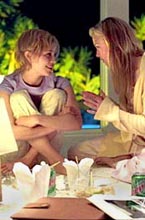Genre DramaRating PG-133 1/2 out of 5 stars
You think you know Michelle Pfeiffer. You’ve seen “Batman Returns,” “The Witches of Eastwick,” and “What Lies Beneath.” For years, she’s been regarded as Hollywood’s friendliest ice queen, but all that changes in her latest film, “White Oleander.”
There’s nothing friendly about her in this new venture.
Pfeiffer plays the mentally unstable artist Ingrid, whose daughter Astrid is the narrator and focus of the movie. Ingrid sees her beautiful daughter as her ultimate masterpiece: beautiful, powerful, but most importantly, hers.
This causes problems when Ingrid decides to poison her latest lover Barry using the juices from the poisonous flower white oleander. When Ingrid is caught, Astrid is shuffled around in the California foster child system.
She goes from foster parent to foster parent, including a woman named Starr (Robin Wright Penn, “Forrest Gump”) who has “found Jesus” but tends to lose him from time to time.
Next is a lonely TV producer’s wife named Claire (Renee Zellweger “Bridget Jones’ Diary”), who at first seems like a ray of light in Astrid’s dark existence.
Though we know Astrid survives the confusion and torment that plague her as she journeys from parent to parent (and more importantly, identity to identity), it’s hardly a consolation. Astrid changes herself so many times during the movie in an effort to find out who she really is that anyone watching the movie is soon to be as confused as she is.
Meanwhile, Ingrid watches her masterpiece change against her own will, which causes even more problems in her already dysfunctional relationship with her daughter.
The performances by all the actresses add to the believability of the movie as a whole, but newcomer Alison Lohman’s performance outshines them all. From the moment we meet her, Lohman plays Astrid beautifully, but more important, believably.
Pfeiffer adds a new, deadly image to her impressive resume of roles, using her chilly eyes and fragile appearance to play Ingrid.
While it’s possible that she may be nominated for best actress, it seems more likely that if anyone from this movie is to be nominated for that award, it would be Lohman.
Pfeiffer’s role is remarkable, however, if she were to carry the movie on her own, most people in the theatre would have gone to see a therapist when the movie ended.
Apart from Lohman, the other person who deserves high praise is the film’s director, Peter Kosminsky. Saddled with a slightly weak script, he keeps the movie from curdling from a drama into a melodrama.
Kominsky delivers a powerful message clearly and beautifully without banging you over the head with a deep inner meaning (see Ridley Scott).”White Oleander” isn’t for those who have faith in the governmental treatment of foster children.
If you have any faith, by the end of the movie, you won’t.Apart from the tragedy and pain in the movie, “White Oleander” is ultimately about redemption, hope and self-discovery.

Ingrid examines the potentially lethal flower that lends its name and potent vitality to the aura of the movie. Michelle Pfieffer portrays the mentally unstable character who uses the beautiful flower for deadly endeavors. (Warner Bros.)







